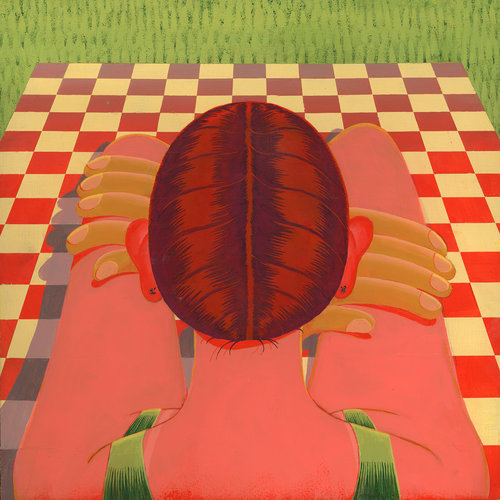
To get a better understanding of Nigerian life, we started a series called ‘Compatriots’, detailing the everyday life of the average Nigerian. As a weekly column, a new instalment will drop every Tuesday, exploring some other aspect of the Nigerian landscape.
This week, a young woman recollects how weight gain in her adolescence, led to the development of an eating disorder. A dark hole she was luckily pulled out of through a mild bout of self-conceit.
At 13, I experienced the most pivotal moment of my adolescence and I was completely unaware of it. Overweight and staring at my mirrored reflection in the guest bathroom one night, I pored over every stretch mark, every neck roll and every swing my arms took from even the slightest jiggle. I had recently learnt that the fastest way to motivate weight loss was to watch yourself eat in the nude. Deciding to spare myself the indignity, I chose the after-effects instead. My protruding stomach from that night’s dinner and my now eclipsed vagina provided double servings of persuasion. Sticking two fingers down my throat, it was the first time I caused myself to throw up after a meal.
For most people, personal weight gain is this big puzzle. This “I just woke up and was 30 pounds overweight” mystery. Like some unknown enemy chose to swap bullets of lead for kilograms of bodyfat and pelt them at night. In my situation, however, I could pinpoint timelines, meals and probably even dates if I thought about it hard enough.
At eight, I was a lean, quick-witted tween, whose world view revolved a little too seriously around the philosophy: ‘you see what that man did? A woman can do it ten times better’ — a belief system taught by a proudly feminist mother and re-inforced by a yet to be shaken faith in self. Primary school academics, sports and leadership were treated with a war-like urgency against my male peers that went beyond my years. So when it came time to marking territory at home against my only two siblings — boys, I went more than a little apeshit.
I made sure pranks against me were repaid with a rather unfair measure of their pound of flesh. I refused to be excluded from physical activities, forcing my way into playing defence, offence and goalkeeping in their football matches. And when it came to those games children play with food — who could steal the most food from the kitchen? Who could take the most food from their siblings? First to finish the most food, I more than held my own.
By ten, after heaps and heaps of food had been consumed, most times in a rush — I went from participating in a multi-player culinary competition to being the sole contender, when even my older male siblings couldn’t keep up with my diet.
It was around this time I started to notice a slight hesitation in my zipper when I put my school uniform on. A new heaviness every time I attempted to stand and a never-ending hunger school lunches and contraband snacks just couldn’t satisfy. By thirteen, after I had made the leap from elementary to junior secondary school, I was clearing a packed ‘lunch’ from home for my ‘second breakfast’. The school provided lunch for an early ‘brunch’ and a purchased meal from the school canteen for my final school meal of the day, all of these supported with intermittent snacking of course.
By that age, all the cheery tones describing my rapidly multiplying waistline and dress sizes to my parents, as mere ‘growing pains’ had gone down three timbres, taking on sombre tones usually reserved for the dying.
“Watch that girl”, they said in stage whispers to whichever parent was toting me around, “she’s getting too big”. All the while pointing accusatory fingers at me, in case I had somehow managed to miss the reference.
And watch that girl I did. By JSS3, I had witnessed myself transform from an athletic, usual suspect for class captain, front and centre bubbly student — to a quiet, too scared to take up space, backbencher.
I hated my body, I hated my appetite, I hated the stares I attracted in public transportation, I hated feeling like I needed permission to exist. By 13, on a six-month extended break home following the completion of my junior WAEC, I become more concerned with my looks than any child psychologist would find healthy — I manically investigated the quickest ways to lose weight.
Reducing portions only worked for a time before I decided to reward myself with daily cheat meals. I felt too awkward exercising and turned to comfort foods when I didn’t see immediate results. Praying about my weight only made me feel pathetic.
It was only when I stumbled across the deceptively exotic-sounding names – ‘bulimia’, ‘anorexia’, eating disorders that have ended lives and ruined food consumption for many, that I realised I stood a fighting chance of losing weight.
After my first try, naked, emptying the contents of my stomach, it became a daily routine. Every meal was followed by a trip to the nearest toilet. My hurls masked by loud music and running water. To hide the tears that usually followed from making yourself sick, I frequently took baths — three or four a day most times. My family never suspected a thing. You had never seen a teenager on holiday so clean.
When I started to see results from denying myself the satisfaction of digesting food, I decided to take things a notch higher. Actual starvation. Where I would take three meals, they became two and even that dwindled to one.
Days where I successfully had no meals, I would beam at my reflection with pride, taking the hunger pangs strumming away in my stomach as victory cries against obesity. Soon, I couldn’t eat a meal without feeling the need to throw up, even without needing the usual prodding of my fingers.
Within 6 months, after routinely throwing up and starving myself, I had managed to go from a soaring size 14 to a fast whittling away 8. I began my senior year of secondary school, a freak to be studied by my peers. ‘Did she have AIDS?’ ‘Maybe she got an abortion?’ ‘How is she so skinny?’
Anyone else would have hated the rumours, I was just happy to be the subject of a conversation that didn’t revolve around the potency of my farts. The fact that I was always dizzy, had come to always find myself hungry and couldn’t bear to look at food without a longing that went beyond hunger were things I chose not to dwell on. That I was essentially living a half-life at only 13 was irrelevant. I was happy to be dress sizes down and society’s idea of beautiful, and that was that.
There’s a chance I would have retained this ‘happiness’, and continued on to be forty-five-year-old taking bathroom breaks in between lunches to empty her gut, had it not been for this post from 2013 by Yagazie Emezi I stumbled on while randomly reading her blog in class in ss1. I can’t believe it’s still on the internet.
The thing about bulimia is, for all the good you might feel losing weight and fitting into envied clothes; a world of harm is being done to your body. From dental sensitivity to throat problems to mineral imbalances, the bad always, always outweighs whatever physical good is thought to be done.
For me, no bad was more unforgivable than the swollen neck glands highlighted by the article. A tell-tale sign of bulimia sufferers, the bloated glands usually result from an irritation caused by constantly having stomach acids pass through the throat.
Taking an excuse from class, I rushed to the school toilet to examine my jawline in 3D, and there it was, staring back at me, a face that was fast taking on the shape of a pufferfish!
I wish I could say something more profound put an end to my bulimia. Perhaps body positivity, or a healthy meal plan I finally decided on and stuck to, but really, I just didn’t want to be called ‘fish face’ by my peers. The fact that Bulimia sufferers have an increasingly high chance of mortality and worrying rates of suicide completely lost on me. I just didn’t want to look funny.
It has been many years since the thought of swollen glands put an end to my disorder for good and even now it is still unbelievable that vanity at such a young age pushed me to do a most unthinkable, hateful thing against my body, and just as easily pulled me out of it. Since then I have adopted a body positivity I wished I had in my youth. Never fretting when the pounds heap on, and being just as casual if they do come off. Life is a little too short to be overrun by kilograms on a scale or people asking that you ‘watch it’ before you even learn about Pythagoras Theorem.




